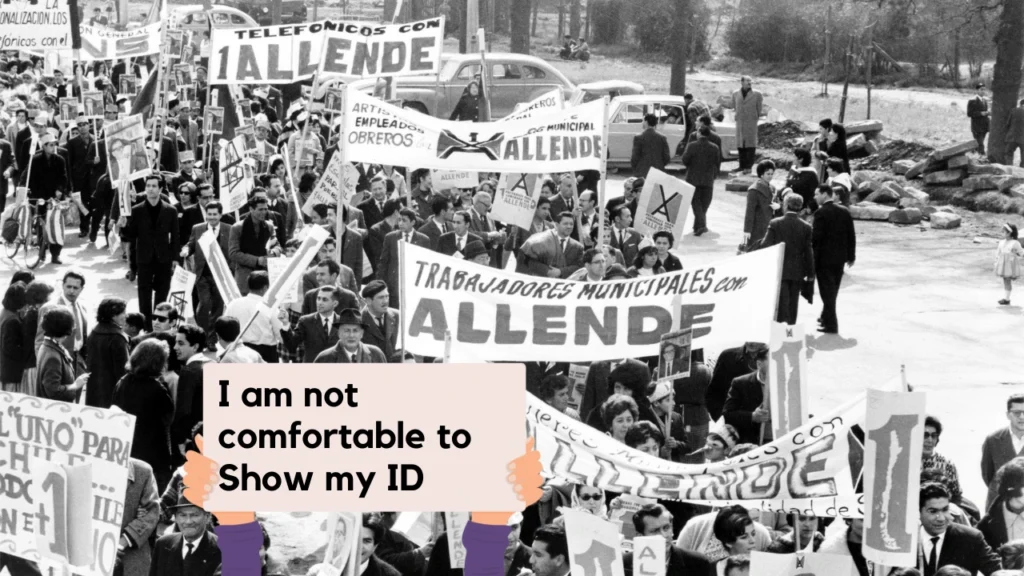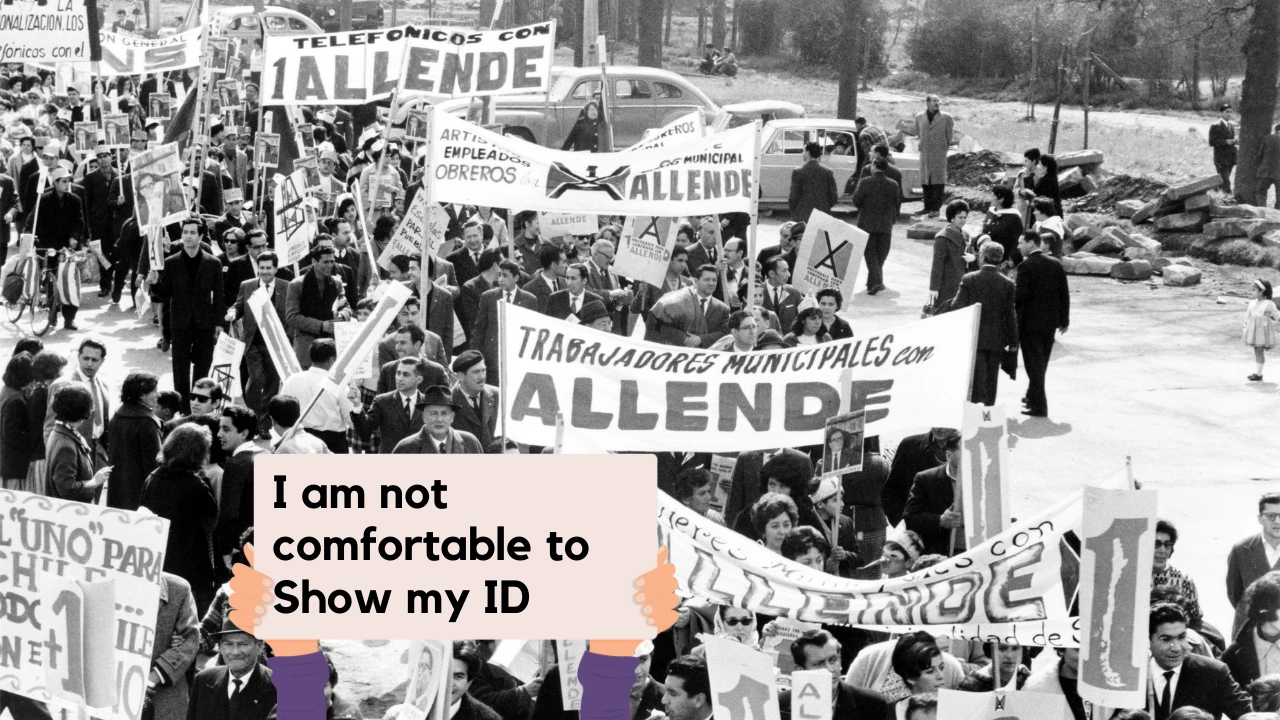What Happens When You Refuse to Show ID in a Public Protest.Public protests are both an emblem of democracy and a crucible of conflict. On one hand, they are vibrant arenas where citizens exercise their right to free expression; on the other, they are moments where law enforcement, legality, and liberty collide.
A frequent and thorny question arises in this context: What happens if you refuse to show identification at a protest? And the answer is not rigid as it depends on where you are, what you are doing, and how law enforcement interprets your presence. To understand the ripple effects of refusing to show ID, let’s navigate through constitutional protections, practical realities, and the potential consequences.
What Happens When You Refuse to Show ID in a Public Protest?-Overview
| If You Show ID | If You Refuse ID |
| Likely citation for minor offense | Risk of arrest or holding |
| Faster release | Longer detention |
| Easier bail process | Complicated bail or delays |
| Officers confirm identity quickly | Treated with added suspicion |
| Less stress in legal follow-up | Greater legal and emotional burden |
The Legal Landscape: Rights vs. Enforcement
The First Amendment in the U.S. guarantees your right to speech, assembly, and protest. This means that, fundamentally, you can chant, carry a sign, or march without fear of reprisal simply for expressing an opinion.
However, the moment police step in whether to check permits, disperse a crowd, or arrest someone, the question of identification surfaces. In many states, you are not obligated to carry identification unless you are driving or engaged in regulated activities. Still, refusing to show ID at a protest can affect what happens next.

Why Police Ask for ID
Law enforcement officials may request ID for multiple reasons during a protest are as given below:
- Verification of identity if you are suspected of committing an offense.
- Processing citations for minor infractions such as blocking traffic, disturbing the peace.
- Immigration-related checks, which can disproportionately affect undocumented individuals.
- Booking procedures if an arrest is imminent.
Civil Disobedience and ID Refusal
Many activists deliberately engage in civil disobedience—breaking laws as an act of protest. For instance, lying down in traffic or refusing to leave a restricted zone is symbolic but legally risky as If you refuse to show ID while practicing civil disobedience, the results are sharper:
- Officers may treat you as “John/Jane Doe” and hold you until fingerprints confirm identity.
- You may face extended detention compared to peers who provide ID.
- If undocumented, refusing ID could complicate immigration risks further.
Consequences in Detail
Before diving deeper, let’s map out consequences in table form for clarity.
| Type of Offense | With ID | Without ID |
| Infraction (littering, traffic blocking) | Officer issues a “promise to appear” ticket and release | Detention until identity verified |
| Misdemeanor (disrupting peace, resisting orders) | Booked and photographed, then likely released with summons | Extended holding; suspicion of flight risk |
| Felony (vandalism, assault) | Bail possible; identity known to court | Bail harder; treated with caution until ID clear |
Protest Dynamics and ID Refusal
Refusing to show ID can influence not just your personal trajectory, but also the flow of a protest.
- Police tactics: Officers may use your refusal as justification to declare non-compliance, potentially escalating the protest.
- Group morale: Your choice may inspire solidarity or lead others to distance themselves for fear of legal entanglement.
- Legal strategy: Some activist groups train participants to carry no ID deliberately, making mass processing more difficult for police. This tactic, however, can backfire if authorities opt for longer detentions.
Balancing Principles with Pragmatism
While asserting one’s right to remain unidentified may feel righteous, it often carries pragmatic downsides. Lawyers frequently advise protesters to carry ID but use silence wisely: provide your name and address if required, but say nothing more. This balances cooperation with constitutional protection.
Regional Variations
Not all states handle ID refusal the same way. “Stop-and-identify” laws exist in some jurisdictions, compelling individuals suspected of crimes to disclose their name. Refusal under such statutes can itself be a criminal offense. In California, for instance, non-motorists generally don’t have to present ID unless arrested, but producing it may save you from being taken to jail for minor infractions. Elsewhere, like Nevada, courts have upheld statutes requiring name disclosure if reasonable suspicion exists.
Regional Differences
To make this clearer, here is a comparison table:
| State Example | Must Show ID? | Practical Consequences |
| California | Not required for non-motorists unless arrested | No ID → possible longer detention |
| Nevada | Yes, under stop-and-identify law | Refusal = separate misdemeanor |
| New York | Not legally required in most cases | Practically may face detention if refused |
| Texas | Only if lawfully arrested | Refusal before arrest generally not punishable |
Psychological and Social Dimensions
Beyond legal implications, refusing to show ID can also have psychological weight. Protest environments are already charged with adrenaline and anxiety. Standing firm in silence may feel empowering, but the accompanying uncertainty, extended confinement, or harsher treatment can weigh heavily on mental health.
Strategic Advice
If you are contemplating attending a protest and wrestling with the ID question, here are distilled recommendations:
- Carry ID if you want to minimize detention.
- Know your rights: you can remain silent beyond giving your name and address.
- Prepare for consequences if engaging in civil disobedience.
- Have a legal support contact written somewhere safe (on your arm or card).
- Avoid unnecessary escalation: asserting rights calmly is more effective than combative refusal.
Final Thoughts
Refusing to show ID at a public protest is a decision stitched with symbolism but soaked in consequence. It can be a gesture of resistance, a tactical move, or an act of defiance but it rarely ends without personal cost. The state has broad powers to hold, process, and eventually identify you.
FAQs for What Happens When You Refuse to Show ID in a Public Protest?
Is it illegal to refuse ID at a protest?
Not always. In most states, unless arrested or in a “stop-and-identify” jurisdiction, you’re not legally bound to show ID.
Will refusing ID prevent arrest?
No, it often increases the chance of being detained longer.
What is the safest approach?
Carry ID, stay silent beyond name/address, and contact a lawyer if detained.
